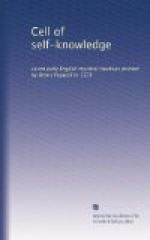On the other hand, the beautiful passage with which the version closes, so typical of the burning love of Christ, shown in devotion to the name of Jesus, which glows through all the writings of the school of the Hermit of Hampole, is an addition of the translator:—
“And therefore, what so thou be that covetest to come to contemplation of God, that is to say, to bring forth such a child that men clepen in the story Benjamin (that is to say, sight of God), then shalt thou use thee in this manner. Thou shalt call together thy thoughts and thy desires, and make thee of them a church, and learn thee therein for to love only this good word Jesu, so that all thy desires and all thy thoughts are only set for to love Jesu, and that unceasingly as it may be here; so that thou fulfil that is said in the psalm: ’Lord, I shall bless Thee in churches’; that is, in thoughts and desires of the love of Jesu. And then, in this church of thoughts and desires, and in this onehead of studies and of wills, look that all thy thoughts, and all thy desires, and all thy studies, and all thy wills be only set in the love and the praising of this Lord Jesu, without forgetting, as far forth as thou mayst by grace, and as thy frailty will suffer; evermore meeking thee to prayer and to counsel, patiently abiding the will of our Lord, unto the time that thy mind be ravished above itself, to be fed with the fair food of angels in the beholding of God and ghostly things; so that it be fulfilled in thee that is written in the psalm: Ibi Benjamin adolescentulus in mentis excessu; that is: ’There is Benjamin, the young child, in ravishing of mind."’[8]
The text printed by Pepwell differs slightly from that of the manuscripts, of which a large number have been preserved. Among others, it is found in the Arundel Ms. 286, and the Harleian MSS. 674, 1022, and 2373. It has been published from the Harl. Ms. 1022 by Professor C. Horstman, who observes that “it is very old, and certainly prior to Walter Hilton."[9] It is evidently by one of the followers of Richard Rolle, dating from about the middle of the fourteenth century. External and internal evidence seems to point to its being the work of the anonymous author of the Divine Cloud of Unknowing.
This is not the place to tell again the wonderful story of St. Catherine of Siena (1347-1380), one of the noblest and most truly heroic women that the world has ever seen. Her life and manifold activities only touched England indirectly. The famous English captain of mercenaries, Sir John Hawkwood, was among the men of the world who, at least for a while, were won to nobler ideals by her letters and exhortations. Two of her principal disciples, Giovanni Tantucci and William Flete, both Augustinian hermits, were graduates of Cambridge; the latter, an Englishman by birth, was appointed by her on her deathbed to preside over the continuance of her work in her native city, and a vision of his, concerning the legitimacy of the claims of Urban the Sixth to the papal throne, was brought forward as one of the arguments that induced England, on the outbreak of the Great Schism in the Church (1378), to adhere to the Roman obedience for which Catherine was battling to the death. A letter which she herself addressed on the same subject to King Richard the Second has not been preserved.




